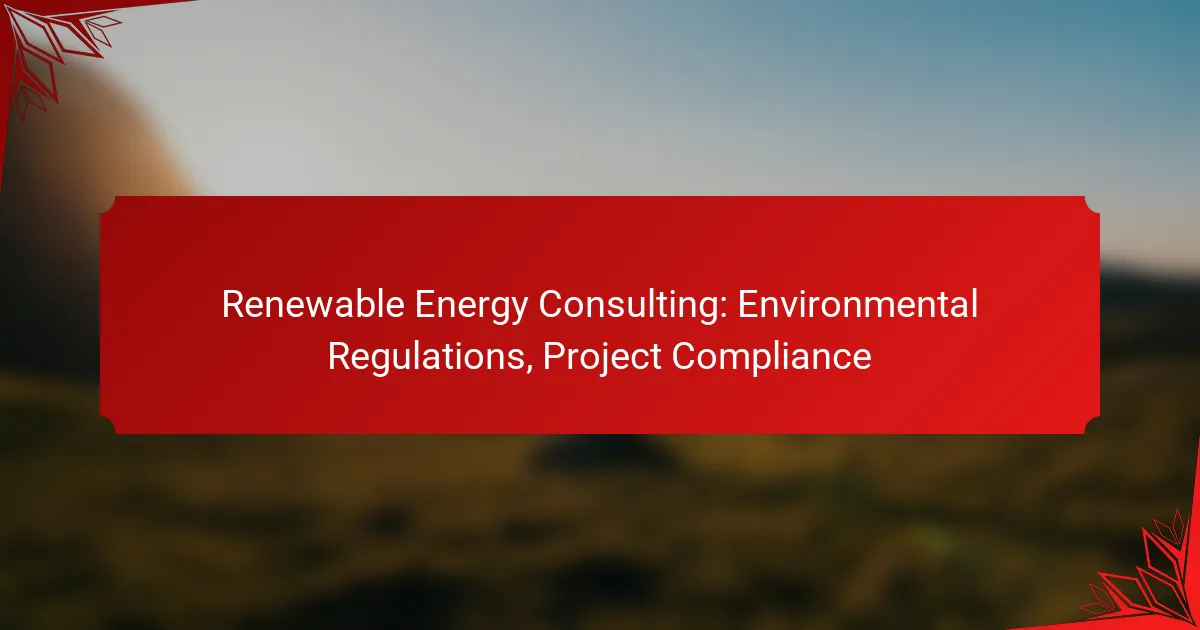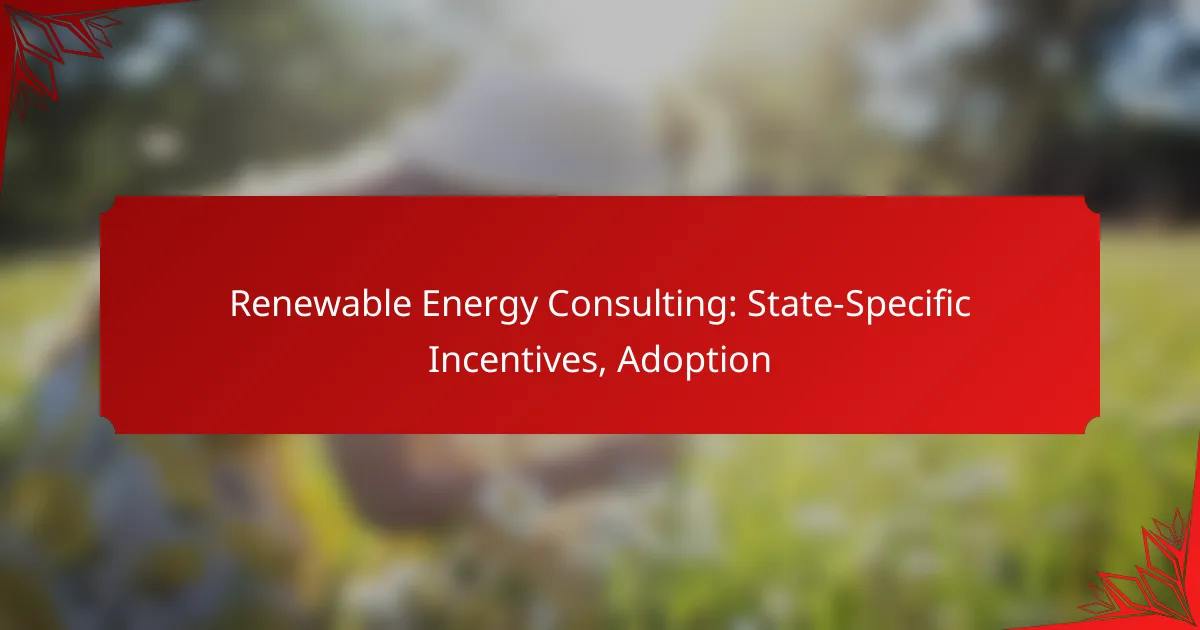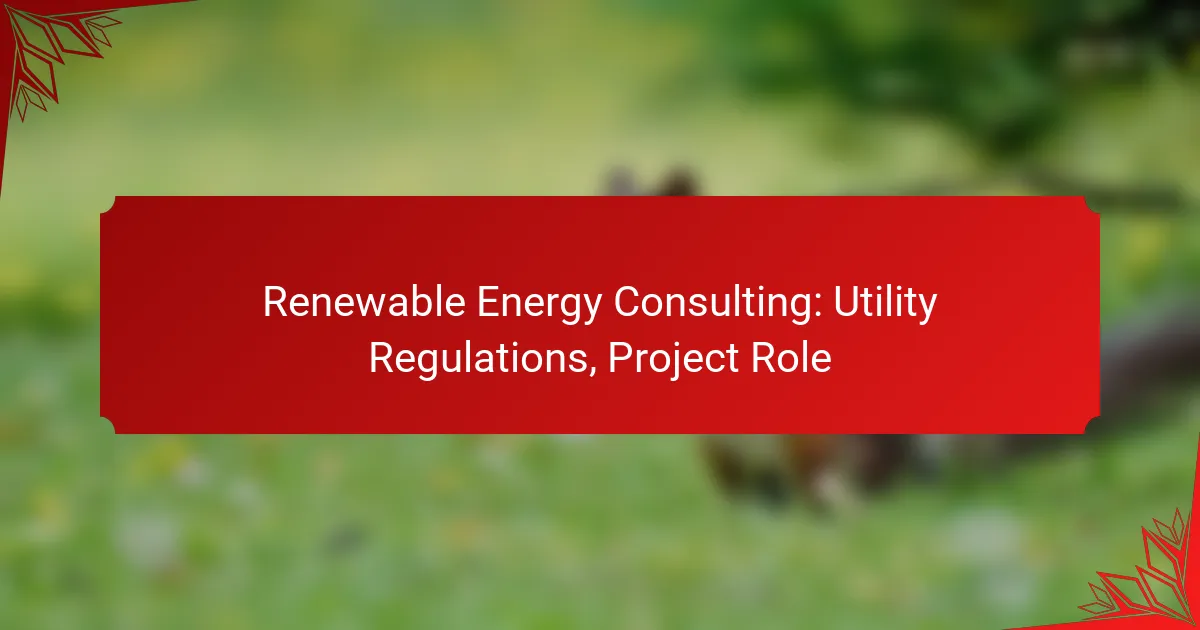Renewable energy consulting is vital for navigating the complex landscape of environmental regulations and ensuring project compliance. By understanding local, state, and federal laws, consultants help organizations streamline their initiatives while promoting sustainability. Their expertise not only mitigates risks of penalties but also facilitates a smoother approval process for renewable energy projects.

What are the best practices for renewable energy project compliance in California?
Best practices for renewable energy project compliance in California include understanding local environmental regulations, following key compliance steps, and addressing common challenges proactively. Adhering to these practices ensures projects meet legal requirements while promoting sustainability.
Understanding California’s environmental regulations
California has a comprehensive set of environmental regulations that govern renewable energy projects. Key regulations include the California Environmental Quality Act (CEQA), which mandates environmental review for projects, and various state and local permitting processes that aim to protect natural resources.
Familiarizing yourself with these regulations is crucial for compliance. Projects must assess potential impacts on air quality, water resources, and wildlife, among other factors. Engaging with local agencies early in the planning process can help clarify requirements and streamline approvals.
Key compliance steps for renewable energy projects
To ensure compliance, start by conducting a thorough environmental impact assessment. This assessment should identify potential risks and outline mitigation strategies. Next, secure all necessary permits from state and local authorities, which may include land use permits, water quality permits, and interconnection agreements.
Regularly consult with legal and environmental experts throughout the project lifecycle. Establishing a compliance checklist can help track progress and ensure all regulatory requirements are met before project initiation and during operations.
Common challenges and solutions
Common challenges in renewable energy project compliance include navigating complex regulations, potential community opposition, and unforeseen environmental impacts. These issues can lead to delays and increased costs if not managed effectively.
To address these challenges, maintain open communication with stakeholders, including local communities and regulatory bodies. Conducting public outreach and incorporating feedback can foster support and reduce resistance. Additionally, developing contingency plans for environmental impacts can help mitigate risks and ensure smoother project execution.

How can renewable energy consultants help with environmental regulations?
Renewable energy consultants play a crucial role in navigating environmental regulations by ensuring projects comply with local, national, and international standards. Their expertise helps organizations avoid penalties and streamline the approval process for renewable energy initiatives.
Expertise in regulatory frameworks
Consultants possess in-depth knowledge of the various regulatory frameworks that govern renewable energy projects. They stay updated on changes in legislation, such as the Clean Air Act or local environmental protection laws, which can significantly impact project feasibility and timelines.
By understanding these frameworks, consultants can guide clients through the complexities of compliance, helping them identify necessary permits and approvals. This expertise minimizes the risk of costly delays and ensures that projects align with environmental goals.
Assistance with documentation and reporting
Documentation and reporting are critical components of environmental compliance. Renewable energy consultants assist clients in preparing the required documentation, such as environmental impact assessments and compliance reports, which are essential for regulatory approval.
Consultants can also help establish effective reporting systems to monitor compliance throughout the project lifecycle. This proactive approach ensures that any potential issues are identified early, allowing for timely corrective actions and reducing the likelihood of regulatory penalties.
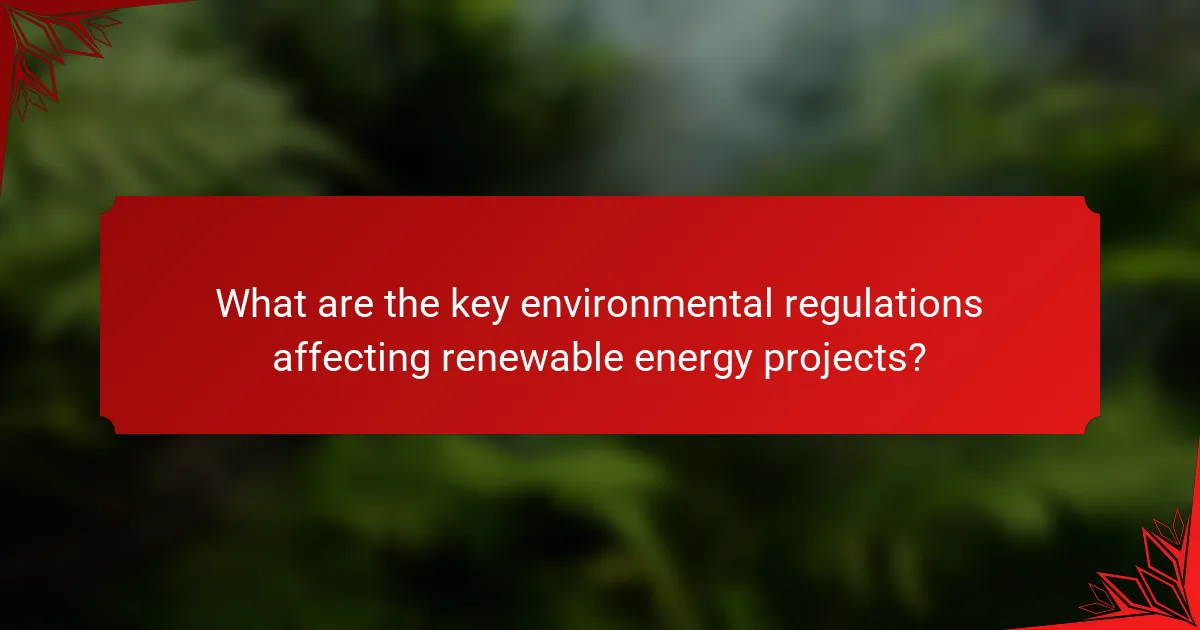
What are the key environmental regulations affecting renewable energy projects?
Key environmental regulations for renewable energy projects include federal and state laws that ensure projects comply with environmental standards. Understanding these regulations is essential for project developers to avoid delays and ensure compliance throughout the project lifecycle.
National Environmental Policy Act (NEPA)
The National Environmental Policy Act (NEPA) requires federal agencies to assess the environmental effects of their proposed actions before making decisions. This includes preparing Environmental Assessments (EAs) or Environmental Impact Statements (EISs) for projects that may significantly affect the environment.
NEPA compliance involves a detailed review process that can take several months to years, depending on project complexity. Developers must engage with stakeholders and the public, addressing concerns and incorporating feedback into project planning.
California Environmental Quality Act (CEQA)
The California Environmental Quality Act (CEQA) mandates that state and local agencies consider the environmental impacts of their actions before approving projects. Similar to NEPA, CEQA requires the preparation of an Environmental Impact Report (EIR) for projects with potential significant effects.
CEQA is known for its rigorous review process, which often includes public comment periods and extensive documentation. Developers should be prepared for potential challenges from community groups and must ensure thorough environmental analyses to mitigate impacts effectively.

What are the benefits of hiring a renewable energy consultant?
Hiring a renewable energy consultant offers numerous advantages, including enhanced compliance with environmental regulations and optimized project execution. These experts help navigate complex regulations, ensuring projects meet legal standards while maximizing efficiency and cost-effectiveness.
Cost savings through compliance
Renewable energy consultants can significantly reduce costs by ensuring compliance with environmental regulations. By avoiding fines and penalties associated with non-compliance, organizations can save substantial amounts of money. Additionally, consultants can identify cost-effective solutions that align with regulatory requirements, further enhancing financial efficiency.
For example, a consultant might recommend specific technologies or practices that qualify for government incentives, leading to lower upfront costs and ongoing operational savings. This proactive approach can result in savings that range from thousands to millions of dollars, depending on the project’s scale and complexity.
Access to industry expertise
Consultants bring specialized knowledge and experience in renewable energy projects, which can be invaluable for organizations. Their insights into best practices, emerging technologies, and regulatory changes help ensure that projects are not only compliant but also innovative and efficient.
By leveraging their industry expertise, organizations can avoid common pitfalls and streamline project timelines. For instance, consultants can assist in selecting the right renewable energy sources, such as solar or wind, based on local conditions and market trends, ensuring that investments are sound and future-proof.

How to choose the right renewable energy consulting firm?
Choosing the right renewable energy consulting firm involves assessing their expertise, track record, and alignment with your project needs. Focus on firms that demonstrate a strong understanding of environmental regulations and project compliance specific to your region.
Evaluating experience and credentials
When evaluating a consulting firm, consider their years of experience in the renewable energy sector and their specific expertise in environmental regulations. Look for certifications or memberships in relevant professional organizations, such as the International Renewable Energy Agency (IRENA) or local regulatory bodies.
Check if the firm has successfully completed projects similar to yours, as this indicates their capability to navigate the complexities of compliance and regulations. A firm with a diverse portfolio across various renewable technologies—like solar, wind, and biomass—can provide valuable insights and solutions.
Assessing client testimonials and case studies
Client testimonials and case studies provide insight into a consulting firm’s reliability and effectiveness. Look for reviews that highlight successful project outcomes, adherence to timelines, and the firm’s ability to manage compliance with environmental regulations.
Request case studies that detail specific projects, including challenges faced and how they were overcome. This information can help you gauge the firm’s problem-solving skills and their approach to project management, ensuring they can meet your unique needs.

What are the emerging trends in renewable energy consulting?
Emerging trends in renewable energy consulting focus on enhancing sustainability and integrating advanced technologies into compliance processes. These trends are reshaping how projects adhere to environmental regulations and meet stakeholder expectations.
Increased focus on sustainability
The emphasis on sustainability in renewable energy consulting is growing, driven by both regulatory pressures and consumer demand. Companies are increasingly required to demonstrate their commitment to sustainable practices, which can include reducing carbon footprints and optimizing resource use.
Consultants are now advising clients on best practices for sustainability, such as implementing circular economy principles and engaging in life cycle assessments. These strategies not only help in compliance but also enhance brand reputation and market competitiveness.
Integration of technology in compliance processes
Technology is playing a crucial role in streamlining compliance processes within renewable energy projects. Advanced software solutions and data analytics tools are being utilized to monitor environmental impacts, track regulatory changes, and ensure adherence to standards.
For instance, using cloud-based platforms allows for real-time data sharing and collaboration among stakeholders, improving transparency and efficiency. Additionally, automation tools can help in managing documentation and reporting, reducing the risk of human error and saving time.
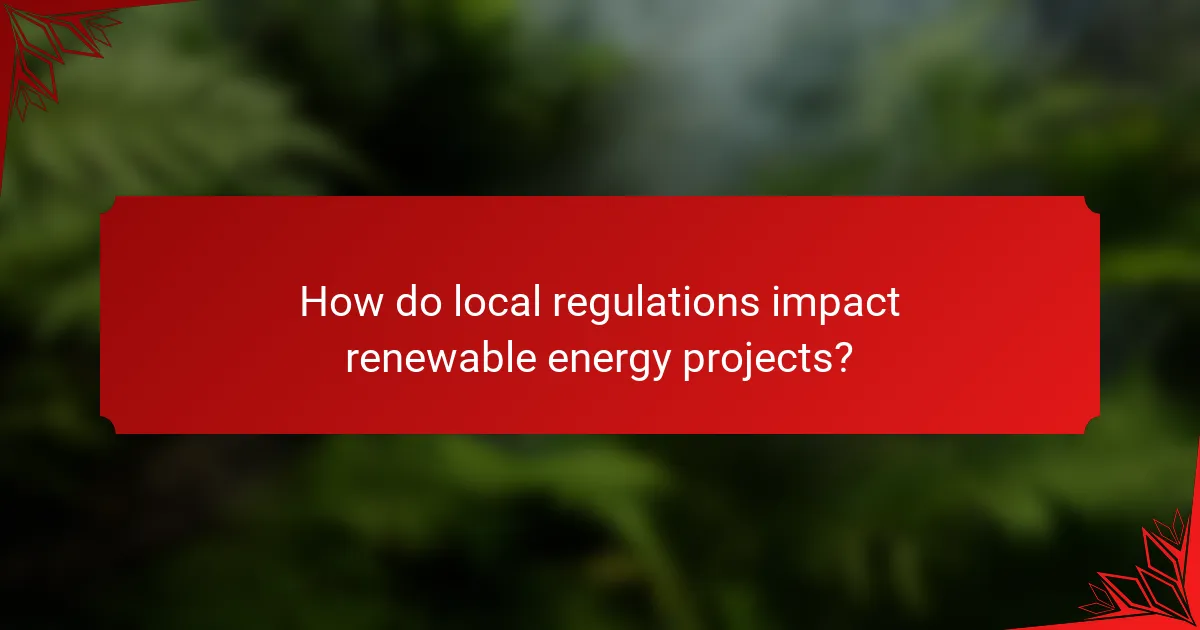
How do local regulations impact renewable energy projects?
Local regulations significantly influence renewable energy projects by dictating compliance requirements, permitting processes, and operational standards. Understanding these regulations is crucial for project developers to ensure successful implementation and avoid legal pitfalls.
Variations in state-level regulations
State-level regulations can vary widely, affecting everything from zoning laws to environmental assessments. For instance, some states may have streamlined permitting processes for solar projects, while others require extensive environmental impact studies. Developers should familiarize themselves with local laws to navigate these differences effectively.
Additionally, certain states offer incentives such as tax credits or grants for renewable energy initiatives, which can significantly enhance project viability. Researching these incentives can provide financial advantages and facilitate smoother project execution.
Importance of local community engagement
Engaging with local communities is essential for the success of renewable energy projects. Community support can lead to smoother permitting processes and reduce opposition, which often delays projects. Developers should prioritize transparent communication and involve local stakeholders early in the planning stages.
Moreover, addressing community concerns about environmental impacts or land use can foster goodwill and collaboration. Hosting informational meetings or surveys can help gauge public sentiment and incorporate feedback into project designs, ultimately leading to better outcomes for both developers and communities.
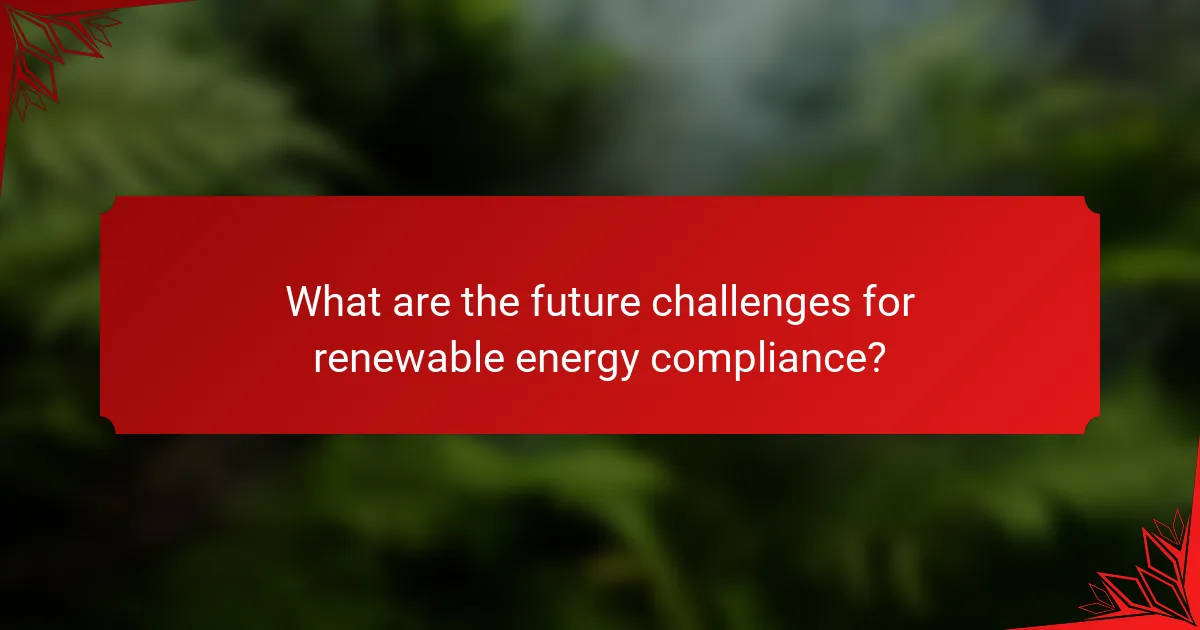
What are the future challenges for renewable energy compliance?
The future challenges for renewable energy compliance include adapting to evolving regulations, ensuring project sustainability, and managing stakeholder expectations. As governments and organizations prioritize environmental protection, renewable energy projects must navigate complex legal landscapes while maintaining operational efficiency.
Adapting to changing regulations
Renewable energy compliance requires constant vigilance as regulations frequently change. Companies must stay informed about local, national, and international laws that govern emissions, land use, and energy production. This can involve monitoring updates from regulatory bodies and participating in industry forums.
To effectively adapt, organizations should implement a robust compliance management system that tracks regulatory changes and assesses their impact on ongoing projects. Regular training for staff on compliance requirements is essential to avoid costly penalties and project delays.
For example, a solar energy project in the European Union may need to comply with the EU’s Renewable Energy Directive, which sets specific targets for renewable energy usage. Understanding such directives helps ensure projects align with both current and future regulatory frameworks.
